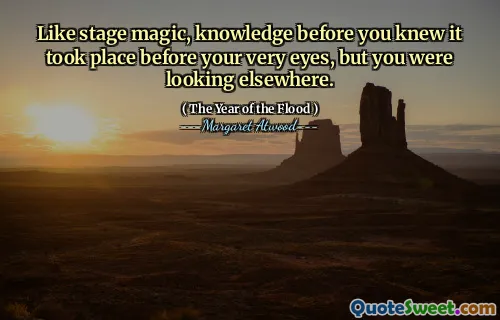Nature may be dumb as a sack of hammers, Zeb used to say, but it's smarter than you.
In "The Year of the Flood," Margaret Atwood explores the complex relationship between humanity and nature. The character Zeb suggests that while nature may appear simple or unintelligent, it possesses an inherent wisdom that surpasses human understanding. This perspective challenges the notion that humans hold superiority over the natural world, highlighting the potential consequences of underestimating it.
Atwood's narrative emphasizes the importance of respecting and acknowledging nature's power and intelligence. The quote serves as a reminder that regardless of human advancements, the natural world operates with its own logic and rhythm, often revealing deeper truths that we may overlook. This theme resonates throughout the novel, urging readers to reconsider their assumptions about humanity's place within the ecosystem.






